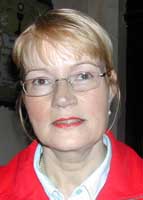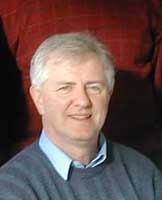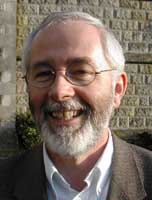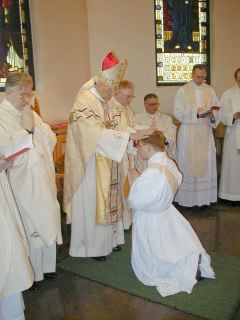|
|
|
June '03 #2 |
This Newsletter is addressed privately to Lay,
Religious, and Jesuits together.
This Newsletter may not print well, as it is designed for the screen only...
sorry about that!
| Contents |
Notice Board Book Advert |
Slí Eile Advert Milltown Institute |
p.1 |
|
|
is seeking to appoint a new full-time Coordinator of the Slí Eile Volunteer Communities These offers young
men and women opportunities For further information please write to Slí Eile - new ways to
explore and discover the important things |
|
Fr. Sean Hughes S.J. died peacefully in Cherrifield
Lodge |
||
|
More from the Assembly In Clongowes, June 7th The text of the talks by
|
|
"Can we renew our determination to go forward together?"
|
 Ignatian Spirituality by Mary Maume, Assistant Pastoral Coordinator
in Clongowes
Ignatian Spirituality by Mary Maume, Assistant Pastoral Coordinator
in Clongowes"The Longest Journey in Life is the Journey Inward" How has Ignatian Spirituality been applied in my life
at this point and The Question:
Ignatian Way With the Ignatian way, all the reactions good or bad were acceptable
and could be incorporated into a way of praying that helped me towards
greater integration. As Roland Roltheiser said about Spirituality
: it is ultimately about what we do with our desires; what we do with
the longing , both in terms of handling the pain and the hope they
bring us , is our spirituality." This put Ignatian Spirituality
in context for me. What is Ignatian Spirituality There is a deliberateness about Ignatian spirituality that struck me from the beginning. It was about noticing what was happening in our lives; It was about exploring a spirituality that works for you personally and makes sense of your personal journey. Where can we see a glimmer of light in the pain and suffering of our lives? In the interaction with someone, what have I learned about my own stubbornness or blindness? It is about recognising or being sensitive to what occurs in our lives on a daily basis. It is more about not drifting with the tide of resignation about what life has given us, but actively creating constructive change.
Through dialogue with people who pray daily, who lead good lives
but are not at peace within themselves, either in their occupations,
or in their family relationships; who are bitter or resentful because
of lost opportunities, I felt that there was a missing link in our
understanding of the message of Jesus: "I have come that you
may have life and have it to the full." John 10:10. Ignatius
points to Jesus and endeavours to deepen the relationship with the
person of Jesus, so that people are brought into an intimate knowledge
of the man who walked the earth. So not only the intellect and will
was used but the creative use of the imagination and the feelings
to get in touch with real flesh and real blood: someone who felt joy,
pain and anxiety as he faced opposition. To be able to create the
scene and journey with the person of Jesus helped me to connect the
human and the spiritual. Composition of Place or in other words recalling
a scene from scripture and being fully present in it, using the senses
as far as possible was a way of praying I was unaware of. In Luke
24 Verse 36 and onwards, trying to visualise the scene as Jesus appeared
to the Eleven, who were agitated and unsure and recalling what he
said: "See my hands and my feet that it is myself; Touch me and
see for yourself; a ghost has no flesh and bones as you can see I
have", was a revelation. When we put time aside to reflect over our daily life and notice
what is happening we call it the examination of consciousness or the
Examen. S o if God wishes to be found here we have to look at ourselves and all those with whom we interact on a daily basis: it throws light on what was good and what was draining. It also looks at more subtle things that we would easily dismiss: a kind word from someone when the going is rough, a student willing to help even though it does not suit him or her. I could glean moments of joy and value perhaps in small insignificant events. Being grateful for the gifts in my life can easily be overlooked and asking God to enlighten me on what he is asking of me was a completely new departure. In the Fifth Year Prayer Group I did the Examen with a small group of fifth year students. After
getting through their initial resistance, they were happy to recognise
the friendship of others; how they felt when they were negative: e.g.
When they were unwilling to entertain someone who was feeling low.
It was useful for them to sit and recall the times when they dismissed
people. They would have rationalised what they did as necessary: e.g.
this was their personal time. On reflection, they were aware that
what was required was an ability to respond to the moment and be with
some one who was not coping well. It created awareness of how Jesus
would respond to a friend in need. It was about sensitive listening
and It also helped them to feel sorrow for their shortcoming. With
boys I felt it was great way for them to talk about how they felt,
how others felt because they were dismissive of them, how preoccupied
they can get. It helped them to focus on making small changes in their
attitudes to their peers. Discernment in making decisions: With the plurality of approach to the Ignatian model it is ideally suited to the life of lay people who are struggling to make sense of their lives amidst the pull of consumer culture and this is very obvious with young people. When a few of the students in the prayer Group spoke about the expectations of the consumer society: the important job, the car, the beautiful partner; to have made it,as they would say. We spoke in the prayer Group about coming back to the school ten years from now, having been successful according to the criteria laid down by the culture, with the beautiful partner on their arm. One student remarked: 'I don't know if I'm really happy.' On the outside it all looks good and I can even visualise a beautiful girl, but I am really pleasing my peers. We spoke about values and what it would feel like to have a peace inside born from doing a job in which you felt you were making a difference; that you felt your decision was on a deeper reflection of who you were called to be. What would the person of Jesus say to both situations? How does it really feel in the heart? They found a terrible struggle to remove themselves from the expectations of the world. They said that they tended to remain with what was predictable for them ; where they knew they would be successful as determined by parents, friends and the culture. Their conclusion was that it was challenging to evaluate both options,
rather than be lured in one direction. Day I looks at who am I, what is the purpose of my life and how might I find fulfillment within that purpose? It is modelled in part on The Principle and Foundation of St. Ignatius. Day 2 who is Jesus in my life? Can I answer the call of Jesus? Day 3 Christ's message for me. Learning bout our potential and endeavouring to appreciate the help we receive from God in achieving our potential. Day 4. Living the message. In our day to day lives, in our relationships with family, school friends, in pour relationship with God. Effects of Kairos: Both the adults and student leaders felt that they gleaned a lot about themselves and their faith, when preparing the talks and had to deal with different emotions. The preparation was a major growth period for them. The retreatants felt that the experience was an intense one, but a very valuable one, resulting in a closer bond with one another and a greater awareness of the other's needs, and a greater sensitivity to their parents. Several students who have experienced Kairos have offered to lead Advent and Lenten Night Prayer and have done so very successfully. Finding God in all things Ignatian Spirituality asks us to find God in all creation, experiencing
God in the beauty of nature, in the disabled whom we work with every
week, (whom I will discuss later) in the lines of poetry that's transformative
for us. What dimension of me was awakened in my reading of the poem
e.g. Canal Bank Walk by Patrick Kavanagh? "Leafy-with-love-banks
and the green waters of the canal Previous to being aware of Ignatian Spirituality, I might enjoy the colours of nature, or walk with quiet serenity through the forest of Donadea, which is quite close to where I reside, but it was more of an escape from the trials of life or in an attempt to renew myself or to share a walk with family or friends. Being aware of God in nature, you use the senses more to absorb the experience in its totality, rather than walk in a semi-comatose state. With a different awareness and connectedness the trials of the world seem fairly insignificant alongside the vastness of creation. Ignatius asks us to use them to assist us in our journey towards God: to find God in all things. How to Pray: Setting time and a place aside for prayer, making a deliberate appointment with the Lord elevates the Prayer time to something significant, so that if I have difficulty keeping the appointment, I do not treat it frivolously. AN act of will and choice is required to make the time available, no matter how short that period is. People do it unconsciously every day: it is part of who they are. It is a swing of the heart to meet the person of Jesus in prayer and imagine that person waiting for me. It is about creating a sacred space somewhere within the house, even in a corner if no other space is available. What matters is to choose the time, Matthew 12: 'Lord it is good for us to be there'. As Ignatius stressed to use what helps, rather than use what you were told would help, gives a great freedom in prayer method. In School the Fourth Year students run a club for disabled adults every Wednesday evening and at the start the boys were reluctant to commence the evening with prayer, but now I notice that they have learned from the disabled a way to pray unselfconsciously, that has affected them very deeply. For e.g. some of the men pray for Mr. Bean because he makes them laugh; they pray for their careers in St. Raphael's and their families; they pray for the boys in school because they are good to them and spend time with them. Now the boys bring their own cares to the prayer session without worrying about the reaction of their peers. It has been a valuable learning experience. The boys also noticed that the disabled live in the present and there are no pretentious: they respond to how people treat them rather than who people are. It is an Ignatian way in a quiet, unpretentious setting. It also challenges us to live in the present; it gives a deeper meaning to relationships in our lives because we are unaware of the future. The awareness of God in all around helps to avoid blaming others when life turns sour, when we experience bereavement or general discontent in our lives. I believe that through the Ignatian Vision we are asked to notice what is happening internally, we are invited to take responsibility for how we feel and given tools to make relevant changes, so that our lives can be more harmonious. It gives us clarity so that the quality of lives can improve. I find the text Sadhana, (A Way to God), by Fr. Tony de Mello very useful with young people as the exercises are short and can be uses very successfully. Spiritual Direction: I would have regarded it as mainly the reserve of religious, but
having experienced Spiritual Direction all year, I realised that it
is an amazing way of again being deliberate in our search for God
and for meaning in life. So much internal movement in our lives can
be missed, or forgotten about and so in Spiritual Direction we notice
the subtleties within, that may be crucial to understanding what is
really happening. "The life of the Spirit is each person's search for spiritual identity, a search that will never be ended in this life. As long as we live we will discover new aspects of our spiritual identity, hidden from time and eternity in the divine Word.". Surely St. Ignatius has given both lay and religious a creative way
of discovering that the 'longest journey in our lives, is the journey
inwards'. Dag Hammarskold in Markings. |
|
|
"The Intellectual,
in the Ignatian Vision, is Not Alone-Standing" Point One: The Foundation for Collaborative Ministry At the outset, I wish to offer you three incidents/'pictures' for
your consideration: Point Two: The Intellectual, in the Ignatian Vision, is Not Alone-Standing If asked (as secondary teacher, philosopher, theologian, social/human
scientist, historian), 'what do you love?', the answer is not, strictly
speaking, 'theology', or 'psychology', or whatever, but rather: not
those things in themselves but those things for the way in which they
enable us to better serve Christ's Kingdom mission. Ignatius as theology
student liked: Point Three: Based on Above, the Issues in Collaborative Ministry
(Intellectual) become: |
|
|
Changing Healthcare Organisations This book is very comprehensive introduction to the
field of organisation development. It is useful, practical resource
for those interested in or directly involved in organizational development
or change in health services - topical in the extreme. |
|
|
Jesuits
on the Web
|
|||
|
|
Milltown Institute:
STRATEGIC ALLIANCE WITH KIMMAGE MISSON INSTITUTE RECOGNISED COLLEGE STATUS FINANCE SPIRITUALITY AT THE CUTTING EDGE FAREWELLS On May 23 we said goodbye to our neighbours CORI, who are moving to new premises at Avila, the ODC centre off Morehampton Road, and to Sr Elizabeth Maxwell who is retiring from the post of Secretary General to become Provincial of the Northern Presentation Province. CORI have been tenants at Milltown Park for nearly 30 years. Their departure enables the Irish School of Ecumenics to undertake much-needed expansion of its premises. |
Updated 20/6/03
Happy St. Aloysius Gonzaga Day - 21st - to all

 Provincial's
Address to the Assembly, June 7th '03
Provincial's
Address to the Assembly, June 7th '03 Learned Ministry; Jim Corkery S.J., Dean, SystematicTheology, Milltown
Institute.
Learned Ministry; Jim Corkery S.J., Dean, SystematicTheology, Milltown
Institute. 
